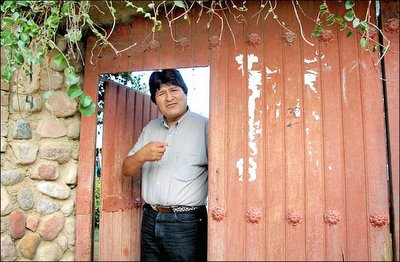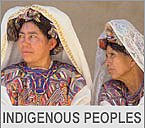



+LATIN AMERICA: Indigenous Leaders Celebrate Morales Victory Diego Cevallos MEXICO CITY, Dec 19 (IPS) - The election of indigenous leader Evo Morales as president of Bolivia is being hailed by native leaders from throughout the region as a "sign of hope" for all impoverished and discriminated indigenous peoples in Latin America.
Guatemalan Nobel Peace Prize laureate Rigoberto Menchú said that Morales has brought "a refreshing wind" for all aboriginal peoples. For his part, the president of the powerful Confederation of Indigenous Nationalities of Ecuador (CONAIE), Luis Macas, said that Morales' victory is a historical landmark unlike anything seen "since the time of Spanish colonialism."
Morales, who captured 51 percent of the votes in Sunday's elections according to preliminary results, will take office on Jan. 22 as the first indigenous president in the history of Bolivia, where 60 percent of the population of 8.6 million identify themselves with one of the country's indigenous groups, according to the 2002 census.
The 46-year-old president-elect, a member of the Aymara community, Bolivia's largest ethnic group, emerged as a leader of the country's coca farmers in the central region of Chapare, and has consistently spoken out for the struggles and demands of the country's poverty-stricken and marginalised indigenous majority.
Menchú, a Mayan Indian activist who was awarded the Nobel Peace Prize in 1992, said that Morales' triumph was "an important precedent in the social struggles of the entire region," but warned that "we know he is going to need all of the support of his brothers and sisters."
Rafael González, chair of the Committee for Campesino Unity (CUC) in Guatemala, told IPS he hopes "Morales' victory will have repercussions throughout the Americas," and that in the future, other indigenous peoples "will have a president who truly represents them, like the one in Bolivia."
There are between 33 and 40 million indigenous people in Latin America, divided into some 400 different ethnic groups, although almost all share something in common: poverty and discrimination.
Indigenous organisations and leaders, like Morales, Menchú, Macas and González, among others, have been struggling to draw attention to this reality and making ever louder demands for political and social change in their countries since the early 1990s.
Over the last 15 years, powerful, organised indigenous movements in Latin America have succeeded in overthrowing governments in Bolivia and Ecuador and forced the issue of aboriginal people's rights onto the political agenda, as in the case of Mexico and the primarily indigenous Zapatista National Liberation Army (EZLN).
Throughout the same period, a growing number of indigenous people have been elected to public office, as mayors, members of Congress and government ministers.
In Bolivia itself, Aymara Indian Víctor Hugo Cárdenas served as vice president from 1993 to 1997. Now an indigenous politician has reached the highest seat of power for the first time in Bolivia.
Morales "will always be able to count on his indigenous brothers and sisters. If we can counsel or support him in any way, we will do so," said Menchú. The Nobel Prize winner cautioned that the new president will be confronting "a very complicated and complex task, because he will be leading a country where racism and discrimination are very deep-rooted," in addition to "serious economic problems, poverty and social and political divisions."
A World Bank report released this year, titled "Indigenous Peoples, Poverty and Human Development in Latin America: 1994-2004", revealed that 74 percent of indigenous people in Bolivia live in poverty.
"Almost two-thirds of the indigenous population is among the poorest 50 percent of the population," the researchers reported, noting that "if gains were perfectly distributed, Bolivia's indigenous population would require about twice as much income per person as the non-indigenous population to escape poverty."
The indigenous population has 3.7 fewer years of schooling (a total of 5.9 years) than the non-indigenous population (9.6 years) in Bolivia, while the incidence of child labour is nearly four times higher among indigenous than non-indigenous children, the study adds.
The World Bank report points out that the political influence of indigenous peoples in Latin America - who account for 10 percent of the population of the region - has "grown remarkably" in the last 15 years, as measured by indigenous political parties and elected representatives, constitutional provisions for indigenous people, and indigenous-tailored health and education policies.
Nevertheless, income levels among this group, as well as human development indicators such as education and health conditions, "have consistently lagged behind those of the rest of the population."
In the five Latin American countries with the largest indigenous populations - Bolivia, Ecuador, Guatemala, Mexico and Peru - simply being born indigenous increases the probability of being poor by between 13 and 30 percent.
Luis Macas believes that the election of an indigenous president will not only benefit Bolivia, but the rest of Latin America as well. His fellow CONAIE representative Miguel Guatemal, the group's organisational director, said it was especially encouraging that Morales had won the presidential elections within a "neoliberal and colonial" system.
"For all of the indigenous peoples of the Americas, Morales' victory is an important precedent that shows there is hope for the future," Guatemal commented to IPS.
(END/2005) Send your comments to the editor Websource: http://us.oneworld.net/external/?url=http%3A%2F%2Fwww.ipsnews.net%2Fnews.asp%3Fidnews%3D31494 zzzzzzzzzz
Indigenous Peoples, Poverty and Human Development in Latin America: 1994-2004
Also available in: Español Indigenous Peoples still lag behind despite increased political power, says new World Bank study
WASHINGTON, May 18, 2005 – Despite their increased political influence, indigenous peoples in Latin America have made little economic and social progress in the last decade, and continue to suffer from higher poverty, lower education, and a greater incidence of disease and discrimination than other groups, says a new World Bank study.
Indigenous Peoples, Poverty and Human Development in Latin America: 1994-2004 considers how social conditions have evolved in the five Latin American countries with the largest indigenous populations (Bolivia, Ecuador, Guatemala, Mexico, and Peru) during the last decade, proclaimed in 1994 by the United Nations as the International Decade of the World’s Indigenous Peoples.
“Although indigenous people in the region have increased their political power and representation during the last decade, this has not translated into the positive results -in terms of poverty reduction- we had hoped to find when we embarked on this research,” said Gillette Hall, World Bank economist and co-author of the study.
The study found that indigenous peoples represent 10 percent of the region’s population and the largest disadvantaged group in Latin America. While the incidence of poverty in Latin America is high, it is particularly severe and deep among the indigenous population.
In Bolivia and Guatemala, for example, more than half of the total population is poor, but almost three-quarters of the indigenous population are poor. Poverty among indigenous people in Ecuador is about 87 percent and reaches 96 percent in the rural highlands.
In Mexico, the incidence of extreme poverty in 2002 was 4.5 times higher in predominantly indigenous than in non- indigenous municipalities, up from a ratio of 3.7 times a decade earlier.
Of all poor households in Peru, 43 percent are indigenous.
Specifically, the report finds that: Few gains were made in income poverty reduction among indigenous peoples during the indigenous peoples’ decade (1994-2004).
Indigenous people recover more slowly from economic crisis. The indigenous poverty gap is deeper, and shrank more slowly over the 1990s. Being indigenous increases an individual’s probability of being poor and this relationship was about the same at the beginning and at the close of the decade. Indigenous people continue to have fewer years of education, but the gap is narrowing, and education outcomes are substantially worse for indigenous peoples, which is indicative of problems in education quality.
Indigenous people, especially women and children, continue to have less access to basic health services.
"Poverty rates among the indigenous population are higher and fall more slowly, which is particularly bad news for a continent that has set its sights on meeting the Millennium Development Goal of halving poverty by 2015,” said Harry Patrinos, World Bank economist and co-author of the study.
In order to achieve better poverty reduction outcomes for indigenous people in the region, the report recommends improving human capital by focusing on four specific areas:
* Provide more and better education through bilingual/bicultural education programs in order to decrease the gap in years of schooling and improve the quality of education.
* Improve accountability in the delivery of social services for indigenous peoples by involving parents and the community more, and by setting clear goals and visions for the system.
* Promote equal health care access for indigenous peoples through the implementation of a sort of "head start" program that focuses on maternal and child health issues.
* Improve data collection efforts related to identifying indigenous populations to be able to better monitor progress over time.
The new Bank study updates findings from a 1994 book1 that established a baseline of conditions among indigenous peoples in Latin America for the early 1990s, and which coincided with the beginning of the International Decade of the World’s Indigenous Peoples. (A grant from the Trust Fund for Environmentally and Socially Sustainable Development helped finance the country studies.)
Contacts: Patricia da Camara (202) 473-4019 Pdacamara@worldbank.org
Alejandra Viveros (202) 473-4306 Aviveros@worldbank.org
1 Indigenous People and Poverty in Latin America by George Psacharopoulos and Harry Patrinos (1994).
Websource:
http://web.worldbank.org/WBSITE/EXTERNAL/COUNTRIES/LACEXT/0,,contentMDK:20505834~menuPK:258559~pagePK:146736~piPK:226340~theSitePK:258554,00.html zzzzzzzzzz
Webphoto Sources:
http://secure.worldbank.org/photolibrary/servlet/main?pagePK=149932 http://digitalmedia.worldbank.org/slideshows/lac_inpeople/
zzzzzzzzzz
Related Links: http://www.indigenouspeople.net http://groups.yahoo.com/group/indigenous_peoples_literature/
zzzzzzzzzzzzzzzzzzzzzzzzzzzzzzzzzzzzzzzzzzzzzzzzzzzzzzzzzzzzzz
No comments:
Post a Comment